200
Should I send my child to music school?
Many of us at a young age attended a variety of clubs and additional classes. Perhaps the most popular of them has always been music lessons. For some, they were a joy, but there are those who still remember music lessons with horror. Adult successful people, after so many years, bitterly recall their childhood stories about the punishment for poor grades or unlearned tasks on music and other “joys” of those classes.
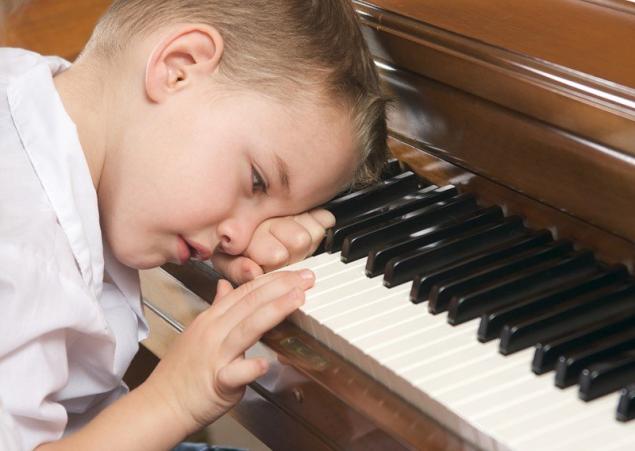
Why is this so, and why do you want your child to play music? Where did this kind of tradition come from? Editorial "Site" Answer questions and share the opinion of a child psychologist Catherine Demina.
The tradition of teaching a child music belongs to us from the past. Previously, music was an integral part of education. And if before the war, only children from wealthy families were engaged in music, then by the 70s of the last century, visiting a music school became almost mandatory for everyone.

This was especially true for girls, for boys, sports sections were mandatory. It was believed that if the child is engaged in music, and not hanging out on the street, it somehow brings parents closer to the privileged class. A kind of echo of the “noble life”, sung in literature: the whole family gathered in the evening in the living room, the girl plays the piano, and her parents look at her with tenderness.
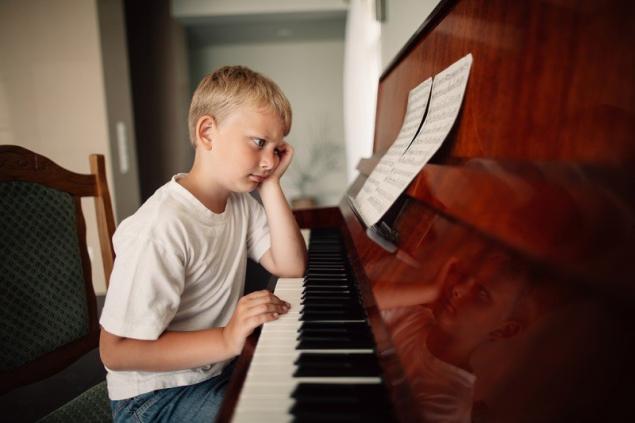
In a way, and now. music-school It is carried out under the same pretext, they say, you will be in decent society and amaze everyone with your skill. Although with the modern world it is poorly compared. As a result, the music school turns into a disgraceful obligation, which at the end you want to forget like a terrible dream.
When a child is asked if he or she wants to learn music, the answer is usually yes. However, the fact is that children and parents have different ideas about these activities. Children think that they will be loudly kicking and singing, and everyone will applaud and praise.

Parents imagine 8 years of diligent work and 5 classes per week for two hours. They want the child to rehearse hard, perform well at concerts, so that mom and dad can be proud of them. Someone in this way embodies their unsatisfied ambitions, someone just wants to show off the child. Everyone has different goals.
Children want to play and have fun, unaware of their parents’ narcissistic aspirations. Tasks and goals of children and parents are different, they do not coincide, so there is a conflict. If there is another good teacher, it will go, and if not, there will be only tears, resistance and loss of interest.
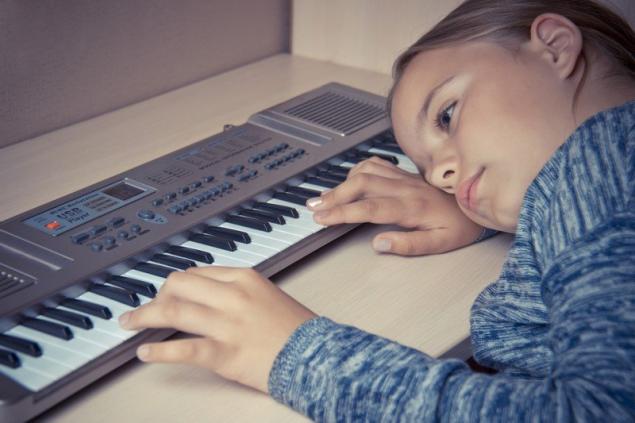
Another reason to send a child to study at a music school is to develop music classes. They really do, and no one will argue. But any other activities with adults develop no less. To prove this, a very interesting experiment was conducted.
The children were divided into three groups. One group was not taught anything additionally. The second was taught a music program, and the third was taught Old French. The course was chosen by chance, just as it could have been makrame. At the end of the year, the results showed that both groups differed for the better. Both are the same.
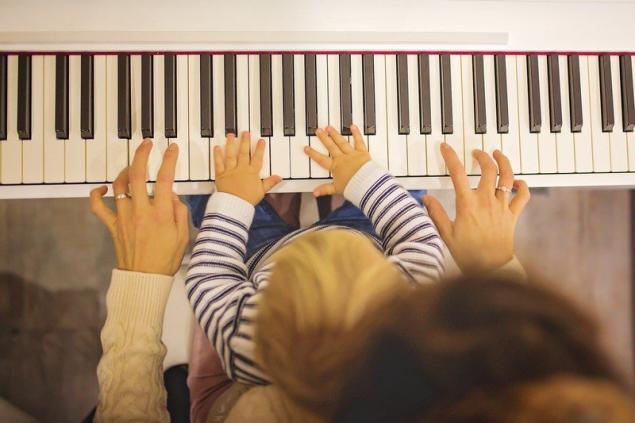
This proves that any activity will develop a child. And it leads us to one conclusion: children should be dealt with. No matter what.
The psychologist says, “We now know that for a child to develop successfully, they need a deep and secure attachment to a meaningful adult.” And if this caring guardian will teach the child slowly, with love, step by step what he owns and burns himself, which is the main value of his adult life, the child will be imbued with this passion, imbued with it like a sponge.
It is such classes that will bring joy to the child, awaken in him a love of creativity and leave pleasant memories. And most exes. music-school These are exactly the opposite experiences: stiffness and tightness in all muscles, a rapid heartbeat as soon as they approach the instrument. Or just unpleasant memories, which is not much better.
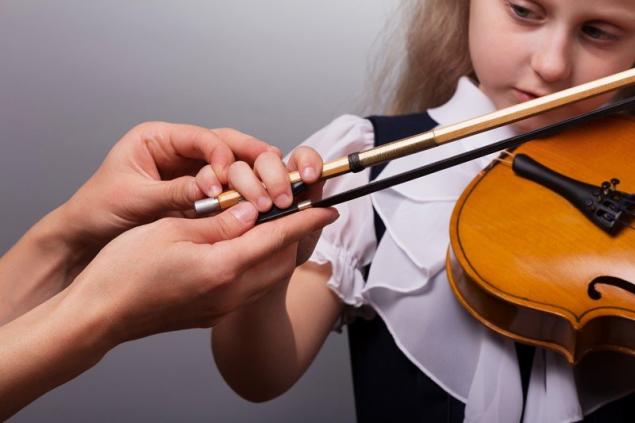
Of course, this was not the case with everyone. Someone had a good teacher who was interested and able to immerse himself in the atmosphere of pure art. When classes were not an obligation, but the desire of the child. In this case, there was pleasure, and the desire to learn, and love for music. For these people, music was an inspiration.
And there is no secret here: you just need the child to want to make music. That he should go to class not because his mother wants to, or to fulfill his father’s ambitions, but only because he wants to. No one forbids you to try, let the child go to music school, but if he does not like it, you do not need to force him.
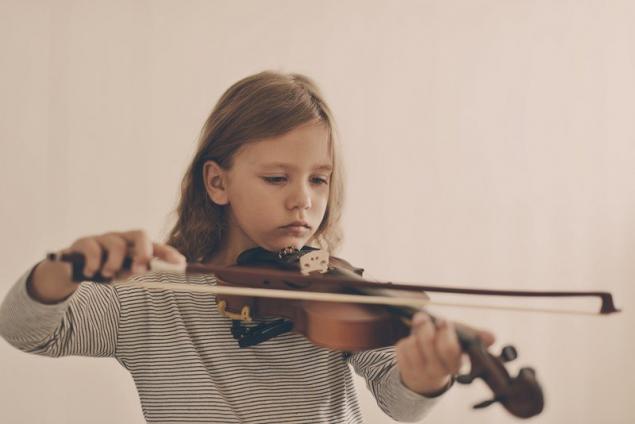
It is very important to give the child the opportunity to choose what he wants to do. Maybe while you make him do his hateful piano lessons, an athlete, a ballerina, or an artist dies in him. Those who want to make music will do it themselves. It is important to understand this and support the child, help him, and not create emotional trauma for the future.
Earlier we told that indicates the high giftedness of the child and how to raise such a baby.
We also talked about why you should not teach your child to read from an early age and when to start.
What's your history with music school?

Why is this so, and why do you want your child to play music? Where did this kind of tradition come from? Editorial "Site" Answer questions and share the opinion of a child psychologist Catherine Demina.
The tradition of teaching a child music belongs to us from the past. Previously, music was an integral part of education. And if before the war, only children from wealthy families were engaged in music, then by the 70s of the last century, visiting a music school became almost mandatory for everyone.

This was especially true for girls, for boys, sports sections were mandatory. It was believed that if the child is engaged in music, and not hanging out on the street, it somehow brings parents closer to the privileged class. A kind of echo of the “noble life”, sung in literature: the whole family gathered in the evening in the living room, the girl plays the piano, and her parents look at her with tenderness.

In a way, and now. music-school It is carried out under the same pretext, they say, you will be in decent society and amaze everyone with your skill. Although with the modern world it is poorly compared. As a result, the music school turns into a disgraceful obligation, which at the end you want to forget like a terrible dream.
When a child is asked if he or she wants to learn music, the answer is usually yes. However, the fact is that children and parents have different ideas about these activities. Children think that they will be loudly kicking and singing, and everyone will applaud and praise.

Parents imagine 8 years of diligent work and 5 classes per week for two hours. They want the child to rehearse hard, perform well at concerts, so that mom and dad can be proud of them. Someone in this way embodies their unsatisfied ambitions, someone just wants to show off the child. Everyone has different goals.
Children want to play and have fun, unaware of their parents’ narcissistic aspirations. Tasks and goals of children and parents are different, they do not coincide, so there is a conflict. If there is another good teacher, it will go, and if not, there will be only tears, resistance and loss of interest.

Another reason to send a child to study at a music school is to develop music classes. They really do, and no one will argue. But any other activities with adults develop no less. To prove this, a very interesting experiment was conducted.
The children were divided into three groups. One group was not taught anything additionally. The second was taught a music program, and the third was taught Old French. The course was chosen by chance, just as it could have been makrame. At the end of the year, the results showed that both groups differed for the better. Both are the same.

This proves that any activity will develop a child. And it leads us to one conclusion: children should be dealt with. No matter what.
The psychologist says, “We now know that for a child to develop successfully, they need a deep and secure attachment to a meaningful adult.” And if this caring guardian will teach the child slowly, with love, step by step what he owns and burns himself, which is the main value of his adult life, the child will be imbued with this passion, imbued with it like a sponge.
It is such classes that will bring joy to the child, awaken in him a love of creativity and leave pleasant memories. And most exes. music-school These are exactly the opposite experiences: stiffness and tightness in all muscles, a rapid heartbeat as soon as they approach the instrument. Or just unpleasant memories, which is not much better.

Of course, this was not the case with everyone. Someone had a good teacher who was interested and able to immerse himself in the atmosphere of pure art. When classes were not an obligation, but the desire of the child. In this case, there was pleasure, and the desire to learn, and love for music. For these people, music was an inspiration.
And there is no secret here: you just need the child to want to make music. That he should go to class not because his mother wants to, or to fulfill his father’s ambitions, but only because he wants to. No one forbids you to try, let the child go to music school, but if he does not like it, you do not need to force him.

It is very important to give the child the opportunity to choose what he wants to do. Maybe while you make him do his hateful piano lessons, an athlete, a ballerina, or an artist dies in him. Those who want to make music will do it themselves. It is important to understand this and support the child, help him, and not create emotional trauma for the future.
Earlier we told that indicates the high giftedness of the child and how to raise such a baby.
We also talked about why you should not teach your child to read from an early age and when to start.
What's your history with music school?























